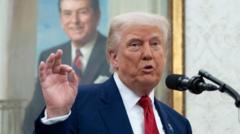The U.S. Court of International Trade has significantly challenged the Trump administration's tariffs, citing a violation of constitutional powers and potentially reshaping future trade policies.
US Court's Landmark Ruling Strikes Down Trump's Tariffs

US Court's Landmark Ruling Strikes Down Trump's Tariffs
A federal court decision undermines major tariff policies of the Trump administration
The U.S. Court of International Trade has dealt a significant blow to President Donald Trump’s tariff policies, ruling that his sweeping import taxes, justified under an emergency law, were unconstitutional. The court declared that the authority to regulate international commerce resides solely with Congress and that Trump's assertion of emergency powers using the International Emergency Economic Powers Act (IEEPA) was overstepping.
In a lawsuit brought by the Liberty Justice Center on behalf of five small businesses, the court found that Trump's tariffs, often termed "Liberation Day" tariffs, were excessive and improperly imposed. Beyond targeting numerous countries, the ruling included specific levies against China, Canada, and Mexico, established in response to drugs and immigration issues, but it did not address tariffs on certain goods such as automobiles and steel.
The White House quickly criticized the court’s decision, asserting that unelected judges should not dictate national emergency responses. "President Trump is determined to put America first using every executive tool available," stated deputy press secretary Kush Desai. Meanwhile, New York Attorney General Letitia James welcomed the ruling, emphasizing the legal boundaries of presidential power and warning of the detrimental economic impact of unchecked tariffs on American families and businesses.
Responses from global markets have been notably positive, with Asian stock markets rising and U.S. futures climbing following the news. This ruling, deemed a tactical shift in trade policy, illustrates the judiciary's stance against potential executive overreach, prompting analysts to suggest it may herald a new level of stability in the economic climate.
Following the ruling, the White House has 10 days to process the halt of these tariffs, although many are already on hold. If the administration’s appeal fails, businesses affected by the now-invalidated tariffs could see refunds, including interest on any payments made under the previous tariff regime.
Market experts note that this ruling may signal "a structural pivot in the narrative," indicating that the presidency cannot unilaterally dictate trade policies. This decision resonates against the backdrop of a tumultuous economic landscape, characterized by previous tariff escalations and negotiations primarily with China.
Since the imposition of these tariffs began on April 2, where tariffs were raised on various trading partners, both domestic and foreign economies have experienced substantial turmoil. The situation developed into a complex trade war with varying reciprocal tariffs and negotiations between the two largest global economies, leading to an eventual truce. As discussions between the U.S. and the EU continue, the implications of judicial oversight on trade policy remain a pivotal topic for future developments.
In a lawsuit brought by the Liberty Justice Center on behalf of five small businesses, the court found that Trump's tariffs, often termed "Liberation Day" tariffs, were excessive and improperly imposed. Beyond targeting numerous countries, the ruling included specific levies against China, Canada, and Mexico, established in response to drugs and immigration issues, but it did not address tariffs on certain goods such as automobiles and steel.
The White House quickly criticized the court’s decision, asserting that unelected judges should not dictate national emergency responses. "President Trump is determined to put America first using every executive tool available," stated deputy press secretary Kush Desai. Meanwhile, New York Attorney General Letitia James welcomed the ruling, emphasizing the legal boundaries of presidential power and warning of the detrimental economic impact of unchecked tariffs on American families and businesses.
Responses from global markets have been notably positive, with Asian stock markets rising and U.S. futures climbing following the news. This ruling, deemed a tactical shift in trade policy, illustrates the judiciary's stance against potential executive overreach, prompting analysts to suggest it may herald a new level of stability in the economic climate.
Following the ruling, the White House has 10 days to process the halt of these tariffs, although many are already on hold. If the administration’s appeal fails, businesses affected by the now-invalidated tariffs could see refunds, including interest on any payments made under the previous tariff regime.
Market experts note that this ruling may signal "a structural pivot in the narrative," indicating that the presidency cannot unilaterally dictate trade policies. This decision resonates against the backdrop of a tumultuous economic landscape, characterized by previous tariff escalations and negotiations primarily with China.
Since the imposition of these tariffs began on April 2, where tariffs were raised on various trading partners, both domestic and foreign economies have experienced substantial turmoil. The situation developed into a complex trade war with varying reciprocal tariffs and negotiations between the two largest global economies, leading to an eventual truce. As discussions between the U.S. and the EU continue, the implications of judicial oversight on trade policy remain a pivotal topic for future developments.



















